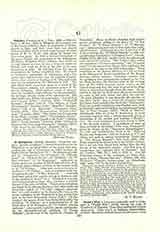

(Roman Breviary: Antiphoae majores, “greater antiphons”), the seven antiphons to the Magnificat in the ferial Office of the seven days preceeding the vigil of Christmas; so called because all begin with the interjection “O”. Their opening words are: (I) “O Sapientia”, (2) “O Adonai“, (3) “O Radix Jesse”, (4) “O Clavis David”, (5) “O Oriens”, (6) “O Rex Gentium”, (7) “O Emmanuel“. Addressed to Christ under one or other of His Scriptural titles, they conclude with a distinct petition to the coming Lord (e.g.: “O Wisdom … come and teach us the way of prudence”; “O Adonai … come and redeem us by thy outstretched arm”; “O Key of David … come and lead from prison the captive sitting in darkness and in the shadow of death” etc.). Couched in a poetic and Scriptural phraseology they constitute a notable feature of the Advent Offices. These seven antiphons are found in the Roman Breviary; but other medieval Breviaries added (I) “O virgo virginum quomodo fiet” etc., still retained in the Roman Breviary as the proper antiphon to the Magnificat in the second Vespers of the feast Expectatio Partus B.M.V. (December 18), the prayer of this feast being followed by the antiphon “O Adonai” as a commemoration of the ferial office of December 18; (2) “O Gabriel, nuntius coelorum”, subsequently replaced, almost universally, by the thirteenth-century antiphon, “O Thoma Didyme”, for the feast of the Apostle St. Thomas (December 21). Some medieval churches had twelve greater antiphons, adding to the above (I) “O Rex Pacifice”, (2) “O Mundi Domina”, (3) “O Hierusalem”, addressed respectively to Our Lord, Our Lady, and Jerusalem. Gueranger gives the Latin text of all of these (except the “O Mundi Domina”), with vernacular prose translation (“Liturgical Year”, Advent, Dublin, 1870, 508-531), besides much devotional and some historical comment. The Parisian Rite added two antiphons (“O sancte sanctorum” and “O pastor Israel”) to the seven of the Roman Rite and began the recitation of the nine on the 15th of December. Prose renderings of the Roman Breviary O’s will be found in the Marquess of Bute’s translation of the Roman Breviary (winter volume). Gueranger remarks that the antiphons were appropriately assigned to the Vesper Hour because the Savior came in the evening hour of the world (vergente mundi vespere, as the Church sings) and that they were attached to the Magnificat to honor her through whom He came. By exception to the rule for ferial days, the seven antiphons are sung in full both before and after the canticle. “In some Churches it was formerly the practice to sing them thrice: that is, before the Canticle, before the Gloria Patri, and after the Sicut erat” (Gueranger). There are several translations into English verse, both by Catholics and non-Catholics, the most recent being that in Dom Gregory Ould’s “Book of Hymns” (Edinburgh, 1910, no. 5) by W. Rooke-Ley, in seven quatrains together with a refrain-quatrain giving a translation of the versicle and response (“Rorate”, etc). The seven antiphons have been found in MSS. of the eleventh century. A paraphrase of some of these is found in the hymn “Veni, veni, Emmanuel” given by Daniel in his “Thesaurus Hymnologicus” (II, 336) and translated by Neale in his “Medieval Hymns and Sequences” (3rd ed., London, p. 171) and others, and used in various hymn-books (Latin text in “The Roman Hymnal”, New York, 1884, 139). Neale supposed the hymn to be of the twelfth century, but it has not been traced back further than the first decade of the eighteenth century. For first lines of translations, see “Julian’s Dict. of Hymnol.” (2nd ed., London, 1907, 74, i; 1551, i; 1721, i). For the Scriptural sources of the antiphons, see John, Marquess of Bute, “Roman Breviary“, Winter, 203, also Marbach’s “Carmina Scripturarum” etc. (Strasburg, 1907) under “O” in the Index Alphabeticus.
H. T. HENRY

